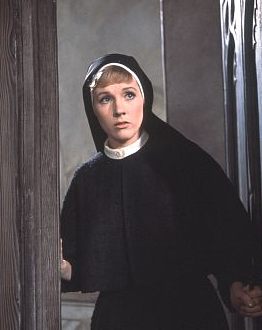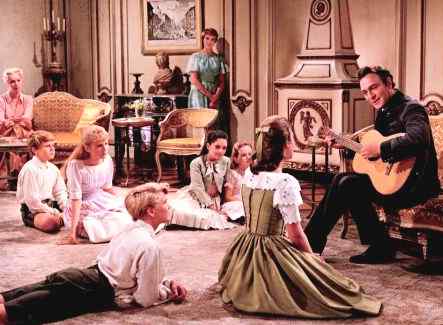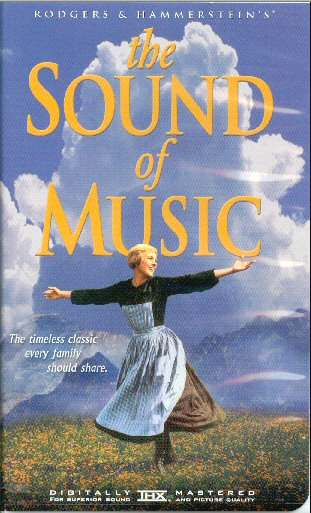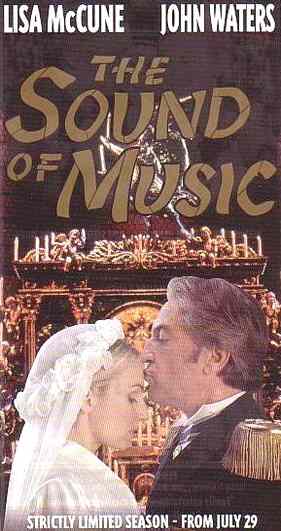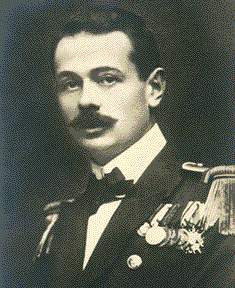|
THE SOUND OF MUSIC
|
||||||||||||||||||||||||||||||||||||||||||||||||||||||||||||||||||||||||||||||||||||||||||||||||||||||||||||||||||||||||||||||||||||||||||||||||||||||||||||||||||||||||||||||||||||||||||||||||||||||||||||||||||||||
|
Julie Andrews as Maria
The Sound of Music is a Broadway musical and film based on the book: The Von Trapp Family Singers by Maria von Trapp. It contains many hit songs, including "Edelweiss", "My Favorite Things", "Climb Ev'ry Mountain", "Do-Re-Mi", "Sixteen Going On Seventeen" and "The Lonely Goatherd", as well as the title song. The film version was one of the biggest box office hits in cinema history and I've bought at least two DVD copies.
Rodgers and Hammerstein wrote their greatest work in the form of their last musical. We all know the story. We know at least one of the immortal songs from the musical, "The Sound of Music", "My Favourite Things", "Do-Re-Mi" or "Edelweiss". If you've not seen the film, put it on your list urgently. I'd recommend a private viewing, or see it with a loved one.
Julie Andrews was believable and unforgettable as the sweet, outspoken novice nun turned governess, who should have received an Oscar that year. Christopher Plummer was dashing as the Captain, and the supporting cast was one of the best ever. The geographic location and mountain scenery are superb. There are unforgettable sequences of this film that deservedly made it the best picture of 1965 and you will get caught up in the story. Why not, let your self go. That is the very essence of a good film.
Plot outline
Part I: In Salzburg, Austria, Maria, a woman studying to become a nun, is sent from her convent to be the governess to seven children of Captain Georg Ritter von Trapp, a widower and a decorated commander in the former Austro-Hungarian Navy. The children, initially hostile and mischievous, come to like her, and the woman finds herself falling in love with the captain. He was soon to be married to Baroness Elsa Schraeder but marries Maria instead. Maria teaches the children singing.
Part II: The Nazis take power in Austria as part of the Anschluss, and attempt to force Captain von Trapp back in service. However, during a singing performance in a guarded theater, the whole family flees and walks over the mountains to Switzerland.
It should be noted that details of the von Trapp story were altered for the play and the film. The Captain's eldest child was a boy, not a girl, and the names of the children were changed (at least partly to avoid confusion, as the Captain's second-eldest daughter was also called Maria). The repertoire of the Trapp Family Singers was entirely classical, with a special focus on early motets. The von Trapps spent some years in Austria after Maria and the Captain had married (in 1927) – they did not have to flee right away – and when they did it was to Italy, not Switzerland, via train, not foot.
Versions
Early films
Two German/Austrian films, Die Trapp-Familie (The Trapp Family, 1956) and a sequel, Die Trapp-Familie in Amerika (1958), were written by Herbert Reinecker and directed by Wolfgang Liebeneiner. Ruth Leuwerik played Maria, Hans Holt was von Trapp.
1959 Broadway musical
The Sound of Music, with music by Richard Rodgers, lyrics by Oscar Hammerstein II, and a book by Howard Lindsay and Russel Crouse, opened on Broadway at the Lunt-Fontanne Theatre on November 16, 1959, and starred Mary Martin as Maria and Theodore Bikel as Captain Georg von Trapp. The original Broadway production cast album on the Columbia label (3 million copies), and ran for 1,443 performances.
1961 London production
The London production opened at the Palace Theatre on May 18, 1961 and ran for 2,385 performances. Jean Bayless played Maria, Roger Dann played Captain Von Trapp and Constance Shacklock was the Mother Abbess.
The Captain serenades his children
The Sound of Music (1965)
Directed
by - Robert
Wise
Genre:
Biography
/ Drama
/ Family
/ Musical
Maria had longed to be a nun since she was a young girl, yet when she became old enough discovered that it wasn't at all what she thought, when she is unable to contain her zest for life. Hence, Mother Superior sends her off in answer to a letter from a retired naval captain for a governess for his seven children, as a challenge. After taking the position as nanny, Maria finds she is the latest in a long line of governesses. Not put off, she teaches the children to sing and that becomes their bonding force. Marie shows the Von Trapp children the miracle of the Sound of Music, and teaches them how to sing.
Captain Von Trapp was widowed several years before and was left to care for his seven 'rowdy' children in strict military fashion. Von Trapp, runs his home near Salzburg like the ship he once commanded. The children serve only to remind him of his deceased wife and his great loss. The Von Trapp home is thus turned into a gloomy place of order and discipline. The children have run off countless governesses by playing tricks on them to gain their father's attention, however with "fraulein" (young lady) Maria they take to her kindness.
Maria soon learns that all these children need is a little love to change their attitudes. As Maria teaches the children to sing, and through her, laughter is brought back into the hearts and home of the Von Trapp family. Unknowingly, Maria and Captain Von Trapp are falling helplessly in love, except there are two problems, the Captain is engaged, and Maria is a postulant!
The family romps through the hills inspire all to sing and to find joy in the smallest things - like raindrops on window panes. With a renewed zest for life, the baron hosts a party to introduce his new fiance.
Finally, when the bold Baroness tells Maria that the Captain loves her she panics & returns to the Abby, where the Rev. Mother tells her she has to look for her life, & so she returns to the home of the Captain & Children by which time Georg Von Trapp decides he can't marry the Baroness if he's in love with Maria, & calls off his engagement & tells Maria. Captain von Trapp's heart opens up to feelings he had forgotten.
The happy ending comes when Maria & Georg Marry, but have to leave Austria as he has to take a position in the Navy round the time the Nazis were in Power, The Sound of Music is based on a true story surrounding The Von Trapp's, & the 40th Anniversary DVD of this has many special features inc. a 50 min documentary on the real Von Trapp Family. This is one of the best films of all time & will always be a classic for all the family.
Also Known As:
Maria and the children
"The Sound of Music" DVD cover
1981 London revival
In 1981, at producer Ross Taylor's urging, Petula Clark signed to star in a revival of the show at the Apollo Victoria Theatre in London's West End. Despite her misgivings that at age 51 she was too old to play the role convincingly, Clark opened to unanimous rave reviews (and the largest advance sale in the history of British theatre at that time). Maria von Trapp herself, present at the opening night performance, described her as "the best" Maria ever. Due to an unprecedented demand for tickets, Clark extended her initial six-month contract to thirteen months. Playing to 101% of seating capacity, the show set the highest attendance figure for a single week (October 26–31, 1981) of any British musical production in history, as chronicled by The Guinness Book of Theatre. This was the first stage production to incorporate the two additional songs that Rodgers had composed for the film version. The cast recording of this production was the first to be recorded digitally, but the recording has never been released on compact disc.
The 1987 Telarc studio cast recording
The Telarc label made a studio cast recording of The Sound of Music with the Cincinnati Pops Orchestra conducted by Erich Kunzel, casting opera stars in the lead roles. Frederica von Stade sang the role of Maria opposite Hakan Hagegard's Captain von Trapp and Eileen Farrell as the Mother Abbess. Kunzel cast children from the Cincinnati School for the Creative and Performing Arts to sing the children's parts. This all-digital recording combined the songs of both the stage and screen versions, and included sections of music that had been recorded for the first time.
The 1988 Takarazuka version
In 1988, the Snow Troupe of Takarazuka Revue performed the musical at the Bow Hall, starring Harukaze Hitomi and Gou Mayuka.
The 1991 Japanese Animation version
In 1991, Nippon Animation produced a series of animation with 40 episodes according to the life of the Trappe family, and was broadcasted by Fuji TV. This series had been broadcast in Italy, Hong Kong, Germany, France, Poland etc.
The 1998 revival
In 1998 director Susan Schulman staged the first Broadway revival of The Sound of Music, with Rebecca Luker as Maria and Michael Siberry as Captain von Trapp. This production later starred Richard Chamberlain as the Captain. This revival opened on March 12, 1998 at the Martin Beck Theatre where it ran for 15 months, then went on to tour in North America.
"The Sound of Music" Australian production
The Australian production
The Australian production of The Sound of Music opened in the Lyric Theatre, in Sydney, New South Wales, with the star of the popular Australian drama Blue Heelers, Lisa McCune, playing the role of Maria von Trapp, TV personality Bert Newton as Max and John Waters as Captain von Trapp. The Von Trapp Children were played by two casts of children, alternating performances. One of these casts included Pia Morley, Christopher Nolan, Stephanie Martonhelyi, Mathew Gammel, Nikki Webster, Rachel Marley and Lauren Vartanian. This production was based on the 1998 Broadway revival staging, directed by Susan Schulman. The show was produced by the Gordon Frost Organisation and Sports and Entertainment Limited.
Other cities the production toured were Melbourne, Victoria, and Brisbane, Queensland.
The show also was also performed in Perth, Western Australia, with Rachael Beck replacing Lisa McCune as Maria, and Rob Guest assuming the role of Captain von Trapp.
2005 Vienna production
In February 2005, the musical premiered at the Volksoper in Vienna. This was the first ever production in Austria. This production starred Austro-Australian actress Sandra Pires as Maria and opera singer Michael Kraus as Captain von Trapp. The production was directed by Renaud Doucet and designed by André Barbe. Erich Kunzel conducted.
2006 London revival
Andrew Lloyd Webber's plans to reopen the musical in London's West End from late 2006 are progressing well. The London Palladium has now been confirmed as the potential venue and Live Nation's David Ian will co-produce with Jeremy Sans at the helm. Already names potentially linked with the new show include Lesley Garrett and Robert Lindsay, whilst the role of Maria will be found on a search across the talent of the UK in a new reality TV show, produced by and starring Lloyd Webber as well as comedian Graham Norton to find the new star. The show will begin previews from November 24, 2006 and will have its opening night on December 5, 2006. The show is initially booking until April 14, 2007 and it is thought that tickets will go on sale sometime in June.
List of Soundtracks
Maria von Trapp
Maria Augusta von Trapp (born Maria Augusta Kutschera in Austria on January 26, 1905; died March 28, 1987) was the matriarch of the Trapp Family Singers. Her story and that of her family's inception and escape from the Nazis during World War II is the inspiration for the musical The Sound of Music.
While a novice, studying to be a nun in a convent in Salzburg, Maria was asked to nurse one of the seven children of widowed naval commander Georg Ritter von Trapp. Maria and Georg fell in love and were married in 1927 after she had relinquished her vows. Having lost their fortune to the European side of the Great Depression in 1932, the family aimed to turn their shared love of music into a career. After performing at a festival in 1935, they became a popular touring act. Shortly after the Nazi annexation of Austria in 1938, the family escaped to Italy and then to the United States. Calling themselves the Trapp Family Singers, the family — which now had ten children — became famous all over again, and were soon touring the world. They made their home at a farm in Stowe, Vermont, where they started a music camp.
Maria never intended to write anything of her life, but a friend persistently pleaded with her not to allow her story to be forgotten by others. She denied she had any writing skill whatsoever, but her friend was not to be put off and kept on asking her whenever they saw each other. Finally, one day, in desperation, Maria excused herself and went to her room for an hour to scribble a few pages about her life story, hoping to prove once and for all she was no writer. However, this displayed such natural writing talent that she reluctantly agreed to finish what she had started, and her jottings formed the basis of the first chapter of her memoirs. Her book, The Story of the Trapp Family Singers, was a best-seller. It was made into two successful German films, and was later adapted into The Sound of Music, a phenomenally successful Broadway musical by Rodgers and Hammerstein, which later spawned an immensely popular US motion picture.
In 1957 the Trapp Family Singers disbanded and went their separate ways. Maria and three of her children became missionaries in the South Pacific. Maria then moved back to Vermont and managed the Trapp Family Lodge until her death in 1987 at the age of 82. Maria von Trapp, her husband (Georg Ritter von Trapp died on May 30, 1947), and Hedwig von Trapp (1917–1972), the fifth child of Georg and Agathe von Trapp, are interred in the family cemetery at the Lodge.
Four of the couple's great-grandchildren currently perform as the Von Trapp Children. Maria von Trapp's granddaughter, Elisabeth von Trapp, is a singer whose concerts are a mixture of Gregorian chant, musical comedy, country and contemporary folk.
Georg von Trapp
Captain Georg Ritter von Trapp
Georg von Trapp (April 4, 1880 - May 30, 1947) headed the famous Austrian singing family immortalized in the musical The Sound of Music. His exploits at sea in World War I earned him numerous decorations, including elevation to the Austrian nobility.
Georg von Trapp was born in Zadar, Croatia (then part of Austria-Hungary) and in 1894 he followed his father's career into the Austro-Hungarian Navy, entering the naval academy at Fiume. He graduated four years later and completed two years of follow-on training voyages including a trip to Australia. In 1900 he was assigned to the armored cruiser Kaiserin und Königin Maria Theresia and was decorated for his performance during the Boxer Rebellion. In 1902, he passed the officer's examination.
He was fascinated by submarines, and in 1908 he seized the opportunity to be transferred to the newly-formed U-boot-Waffe. In 1910 he was given command of the newly-constructed U-6, which was christened by Agathe Whitehead, granddaughter of the Englishman Robert Whitehead, inventor of the torpedo. Georg and Agathe were married on March 1, 1912. He commanded U-6 until 1913.
On April 22, 1915, he took command of U-5 and conducted nine combat patrols. In October 1915 he was transferred to the captured French submarine Curie, which the Austrian Navy redesignated U-14. He conducted ten more war patrols, until, in May 1918, he was promoted to Korvettenkapitän and given command of the submarine base in the Gulf of Kotor.
At the end of World War I, Trapp's wartime record stood at 19 war patrols, 12 cargo vessels totalling 45,669 tons sunk, the French armored cruiser Leon Gambetta (12,600 tons) and the Italian submarine Nereide (225 tons).
For his wartime service, Trapp was raised to the nobility and granted the right to use the word von (of in English) before his name. Among other honors, he received a knighthood and the Knight's Cross of the Order of Maria Theresa. The title of Ritter appearing after his first name is sometimes incorrectly translated as Baron, but it is approximately equal to "rider" or knight. Its meaning is closer to the British Sir.
Life between the world wars
World War I ended with Austria defeated and stripped not only of its Navy, but of its entire sea coast.
Trapp attempted to settle down with his wife and seven children, but in 1922, four years after the war, an epidemic of scarlet fever infected some of the children, and his wife Agathe caught it from the children and died. He began raising his family alone. In 1924, when his daughter Maria was advised by the doctor to stay home from school as she was recovering from the scarlet fever, he hired a novice from a local convent to teach her at home. The family had always shared a love of music (they often sang three-part harmony lieder together) and the novice, Maria Kutschera, joined in the children's musical education. She and Georg married in 1927. Maria would bear the Ritter three more children.
When the economy crashed in 1932 (the European side of the Great Depression), the Trapps lost most of their wealth. They began singing as a way to raise some money, and received high honors at the Salzburg Music Festival of 1936. Their fame brought them invitations to sing all over Europe. Hitler asked the family to sing at his birthday party, but the Trapps declined. The Nazis made other offers to the famous naval hero, but even command of a submarine base did not tempt Trapp.
Unlike many Austrian aristocrats, the Trapps were horrified by the Anschluss of 1938. Georg made no secret of his feelings; allegedly, the Gestapo ordered the von Trapps to display the Hakenkreuzflagge (swastika flag) for Hitler's visit to Salzburg, but Georg replied, "I can do a better job with one of my Persian carpets." Shortly afterwards the family fled to Italy by train (not to Switzerland on foot as in the film) and then to the United States. Georg Ritter von Trapp died of lung cancer on May 30, 1947 in Stowe, Vermont. His children by Agathe were Maria, Rupert, Agathe, Werner, Hedwig, Johanna and Martina; those by Maria were Rosmarie, Eleonore and Johannes.
Film Trivia
Maria finds love
LINKS and REFERENCES
A - Z FILMS INDEX
A - Z ACTORS INDEX
A taste for adventure capitalists
Solar Cola - a healthier alternative
|
||||||||||||||||||||||||||||||||||||||||||||||||||||||||||||||||||||||||||||||||||||||||||||||||||||||||||||||||||||||||||||||||||||||||||||||||||||||||||||||||||||||||||||||||||||||||||||||||||||||||||||||||||||||
|
This website is Copyright © 1999 & 2017. The bird logos and name Solar Navigator and Solar Cola are trademarks. All rights reserved. All other trademarks are hereby acknowledged. Max Energy Limited is an educational charity. |
||||||||||||||||||||||||||||||||||||||||||||||||||||||||||||||||||||||||||||||||||||||||||||||||||||||||||||||||||||||||||||||||||||||||||||||||||||||||||||||||||||||||||||||||||||||||||||||||||||||||||||||||||||||
